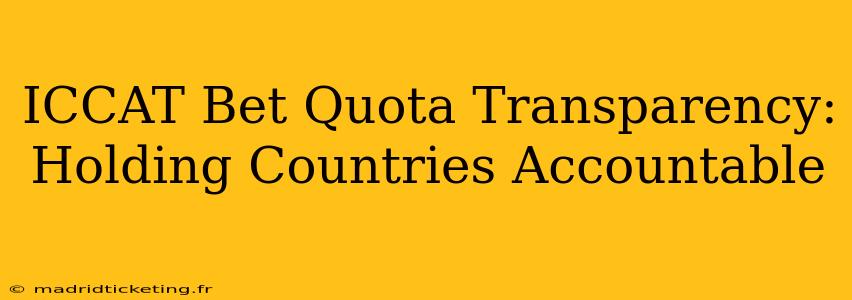The International Commission for the Conservation of Atlantic Tunas (ICCAT) sets quotas for various tuna species in the Atlantic Ocean. However, a lack of transparency surrounding these quotas and their enforcement raises serious concerns about the sustainability of these valuable fish stocks. This article delves into the issue of ICCAT bet quota transparency, exploring the challenges and advocating for greater accountability from member countries. We'll examine the current system, highlight its shortcomings, and propose solutions to ensure the long-term health of Atlantic tuna populations.
What is ICCAT and why is quota transparency important?
ICCAT is an intergovernmental organization responsible for the conservation of tuna and tuna-like species in the Atlantic Ocean and adjacent seas. Its effectiveness hinges on the accurate setting and transparent enforcement of catch quotas. Transparency is paramount because it allows for:
- Scientific scrutiny: Independent researchers and conservation groups can assess the validity of quota setting based on scientific data. Opaque processes hinder this crucial oversight.
- Public accountability: Governments are held accountable to their citizens and the international community for their fishing practices. Hidden quotas allow for potential overfishing and circumvention of regulations.
- Effective enforcement: Transparent data enables better monitoring, control, and surveillance (MCS) efforts to combat illegal, unreported, and unregulated (IUU) fishing.
Without transparency, the entire system is vulnerable to manipulation and undermines the conservation goals ICCAT aims to achieve.
How Transparent is ICCAT's Quota System?
While ICCAT publishes some data on catch limits, significant gaps remain. Many critics argue that the current system lacks the necessary detail and accessibility to ensure true transparency. This opacity allows for:
- Underreporting of catches: Countries may underreport their catches to avoid exceeding their quotas.
- Misallocation of quotas: Quotas may be allocated unfairly, benefiting some countries at the expense of others or the overall health of the stocks.
- Lack of enforcement: Without clear and accessible data, it’s difficult to track compliance and hold countries accountable for violations.
The lack of readily available, detailed data on catch limits per vessel, fishing gear used, and precise locations hampers independent verification and effective monitoring.
What are the consequences of a lack of transparency?
The consequences of insufficient transparency in ICCAT's quota system are severe:
- Overfishing: The unsustainable harvesting of tuna species leads to population declines and threatens the long-term viability of these valuable resources.
- Economic losses: Overfishing can have devastating economic impacts on fishing communities and the wider seafood industry.
- Ecosystem disruption: The depletion of tuna populations can have cascading effects on the entire marine ecosystem.
- Loss of biodiversity: Reduced tuna populations can lead to a decrease in overall biodiversity in the Atlantic Ocean.
The cumulative effects of these consequences threaten the ecological and economic stability of the region.
What steps can be taken to improve ICCAT quota transparency?
Several key actions can significantly improve ICCAT's quota transparency:
- Open data initiatives: ICCAT should make all catch data, including vessel-specific information, publicly available in a readily accessible format. This data should be regularly updated and easily analyzed.
- Independent audits: Regular independent audits of ICCAT's quota-setting process and member country compliance should be conducted to ensure accuracy and accountability.
- Strengthened enforcement: More robust mechanisms for monitoring, control, and surveillance (MCS) are needed to detect and punish IUU fishing. This includes enhanced cooperation between member states and international organizations.
- Increased stakeholder engagement: Involving a wider range of stakeholders, including scientists, conservationists, and fishing communities, in the quota-setting process can ensure a more informed and participatory approach.
- Improved data collection methodologies: ICCAT needs to invest in better data collection methods, employing technologies like electronic monitoring systems to improve accuracy and reliability.
How can we hold countries accountable for their actions?
Holding countries accountable requires a multi-pronged approach:
- Public pressure: Raising awareness among consumers and advocating for policies that support sustainable fishing can put pressure on governments to improve their transparency and compliance.
- International cooperation: Strengthening collaboration between ICCAT, other regional fisheries management organizations, and international bodies like the UN can facilitate greater oversight and accountability.
- Trade sanctions: Countries that consistently violate ICCAT regulations should face trade sanctions, creating a powerful disincentive for non-compliance.
- Legal action: NGOs and concerned citizens can utilize legal channels to challenge countries' actions when they violate ICCAT's rules or fail to meet transparency standards.
By implementing these measures, we can move towards a more transparent and effective ICCAT system, ensuring the long-term conservation of Atlantic tuna and the sustainability of the fisheries that depend on them. The future of these valuable resources rests on our collective commitment to transparency and accountability.

